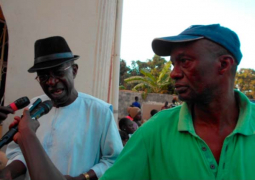The Vice President and minister of Women’s Affairs, Aja Dr. Isatou Njie-Saidy, yesterday launched the 2011 UNDP Human Development Report entitled “Sustainability and Equity: A Better Feature for All.”
The report, among others, highlights the positive synergies which exist between greater equity and sustainability, and which offer win-win solutions for achieving both.
It also highlights the need to increase financing for environmental and social protection, while advocating for possible new public financing mechanisms, which merit serious consideration and must be explored.
The report identifies pathways for people, local communities, nations and the international system to promote environmental sustainability and equity in mutually reinforcing ways.
In her launching statement, the Vice President said the report has taken one step forward; it asks whether we can expect this positive trend to continue, and makes a set of projections for how our world will look, over the next decades.
“The 2011 Human Development Report shows that most people today live longer, are more educated, and have better access to goods and services than ever before. Even in economically distressed countries, people’s health and education have improved greatly,” she said.
However, she noted that despite the human development progress of recent years, not all sides of the story are positive.
“Income inequality has worsened, and production and consumption patterns, especially in rich countries, seem to be unsustainable. A key theme of this report is that the world’s most disadvantaged people carry a double burden,” she stated.
More vulnerable to environmental degradation, the Vice President added, they must also cope with immediate environmental threats, from indoor air pollution, dirty water and unimproved sanitation.
She told the gathering that the accelerating environmental destruction has put a double burden of deprivation on the poorest households and communities.
Even though the poor rely on natural resources for their livelihoods, we know that poverty reduction cannot be sustained, if the ecosystems, on which we depend, are irreparably damaged,” she asserted.
She further revealed that the world’s average Human Development Index (HDI) has increased by 18% between 1990 and 2010 thus reflecting large improvement, in life expectancy, school enrolment, literacy and income.
VP Njie-Saidy also stated that the
This, she added was a result of improvements, in life expectancy at birth, and many years of schooling.
However, despite the human development progress of recent years, VP Njie-Saidy asserted that the income inequality has worsened as well as the production and consumption partners especially in the rich countries that seem to be unsustainable.
Chinwe Dike, UNDP country representative also said the report is forward looking; and asks whether we can expect the positive trend to continue, especially among developing countries.
She told the gathering that the report addresses the central challenge of the 21st century which is: “can development progress continue in ways that will raise living standards for all – without harming our environment?”
“The answer to this question is critical, because we know that, as things are, when we tap into our potential to raise living standards for all nations, and for all peoples in this generation and those to come, we also run the risk of causing irreparable damage to our environment,” she continued.
The key message of the report, Ms Dike added, is that equity and sustainability are inextricably linked, and that one will not be achieved without the other.
“We value sustainability because future generations should have at least the same possibilities as we do today,” she added.
She underscored UNDP’s happiness to have supported national development processes around the world for more than fifty years, noting that the guiding principles of their work have been national ownership of the development process, and the conviction that international partnerships can play a valuable role.
UNDP’s role, she went on, is to support transformational change which brings about real improvements in people’s lives.
Also speaking at the launching was Janice James, economic adviser UNDP-The Gambia, who said the most important objective of a Human Development Report is to influence and advocate policy so that deprivation is eliminated.
She stated that critical to progress in human development is the ability to measure and closely monitor it.
“The collection of human development data lends itself to evidence-based policy-making that helps reduce the forms of social, political and economic exclusion that otherwise keep people from realizing their capabilities,” she stated.


